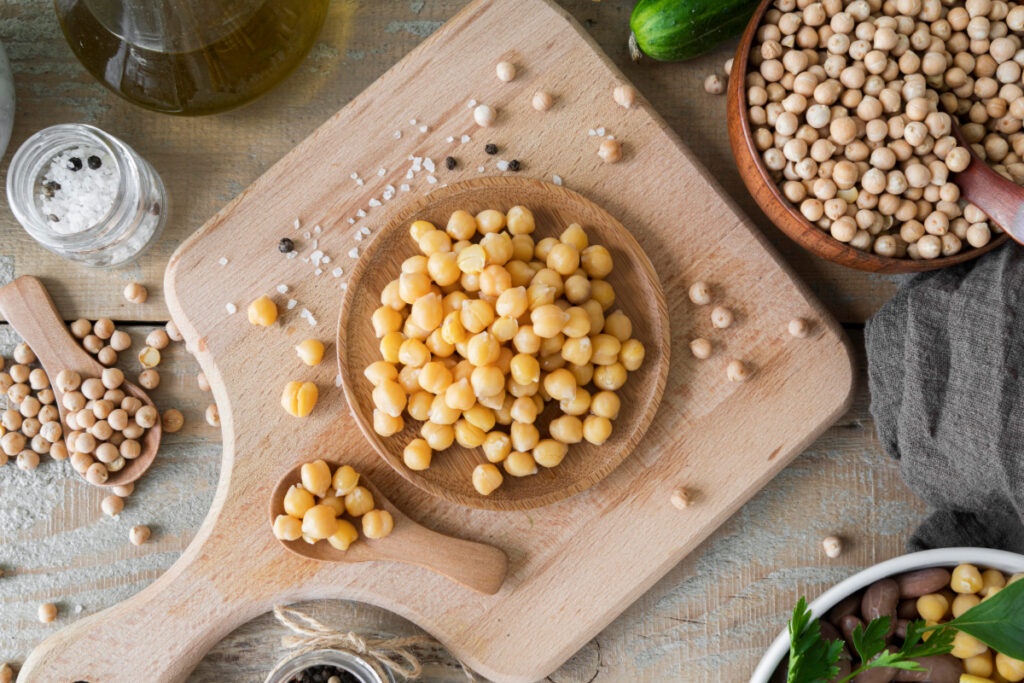Is it okay to eat chickpeas every day? This common question arises as chickpeas—also known as garbanzo beans—gain popularity for their versatility and nutritional value. A staple in Middle Eastern, Mediterranean, and Indian cuisines, chickpeas are rich in protein, fiber, and essential vitamins. While they’re a favorite among vegetarians and vegans, eating chickpeas daily requires mindful preparation and portion control to maximize benefits and minimize potential digestive discomfort.

In this comprehensive guide, we explore the benefits, risks, and best practices for incorporating chickpeas into your daily diet. For ideas on incorporating chickpeas into meals, try recipes like Marry Me Chickpeas that balance flavor and nutrition.
Table of Contents
Is it okay to eat chickpeas every day? Many health-conscious individuals ask this when incorporating more plant-based meals into their diet.
The Nutritional Profile of Chickpeas
Chickpeas are renowned for their dense nutrient content, making them an excellent addition to any diet. Here’s why they’re a superfood:
1. Macronutrients
- Protein: Chickpeas are a rich source of plant-based protein, essential for muscle repair, growth, and maintaining a healthy immune system.
- Fiber: They support digestion, regulate cholesterol, and help maintain stable blood sugar levels.
- Healthy Carbohydrates: Chickpeas provide sustained energy, thanks to their complex carbohydrates.
2. Micronutrients
- Folate: Crucial for cell repair and especially beneficial for pregnant women.
- Iron and Zinc: These minerals support energy levels and immune health.
- Magnesium and Potassium: Vital for muscle function and heart health.
Chickpeas are not only nutritious but also versatile, making them a go-to ingredient in countless recipes. Learn how to incorporate them into your meals by exploring the ultimate guide to avocado toast seasoning.
Benefits of Eating Chickpeas Every Day
1. Supports Digestive Health
Chickpeas are high in soluble fiber, which helps:
- Promote regular bowel movements.
- Nourish gut bacteria, contributing to a healthy microbiome.
- Prevent constipation and improve overall gut health.
Adding chickpeas to your diet can also help alleviate minor digestive issues caused by a lack of fiber in your meals.
2. Aids in Weight Management
Chickpeas are filling due to their high fiber and protein content. These nutrients increase satiety, making you feel full for longer and reducing overall calorie intake. Studies have shown that including chickpeas in meals can help with weight loss or maintaining a healthy weight.
3. Regulates Blood Sugar Levels
Chickpeas have a low glycemic index (GI), meaning they cause a gradual rise in blood sugar rather than a spike. This makes them ideal for individuals with diabetes or those looking to stabilize energy levels throughout the day.
4. Boosts Heart Health
Rich in magnesium, potassium, and fiber, chickpeas contribute to lower blood pressure and reduced LDL (bad cholesterol). These benefits make chickpeas an excellent choice for promoting cardiovascular health.
For more on the health advantages of chickpeas, visit chickpeas and blood sugar regulation.
While chickpeas offer impressive health benefits, it’s valid to ask: is it okay to eat chickpeas every day, especially for sensitive digestion?
Risks of Eating Chickpeas Every Day
Despite their benefits, consuming chickpeas daily can have potential downsides, especially if eaten in excess or without proper preparation.
1. Digestive Discomfort
Chickpeas are high in oligosaccharides, a type of carbohydrate that ferments in the gut. This can lead to:
- Bloating
- Gas
- Stomach cramps
To mitigate these effects:
- Soak chickpeas overnight before cooking to reduce oligosaccharides.
- Cook chickpeas thoroughly to make them easier to digest.
- Gradually introduce them into your diet if you’re not used to high-fiber foods.
For more details on managing these issues, explore Is There Anything Unhealthy About Chickpeas?.
2. Overconsumption Risks
While chickpeas are healthy, eating too many can lead to:
- Caloric Excess: Processed forms, such as hummus or roasted chickpeas, can be calorie-dense due to added oils or sugars.
- Fiber Overload: Consuming excessive fiber may cause digestive strain, leading to discomfort or nutrient malabsorption.
Stick to ½–1 cup of cooked chickpeas per day to enjoy their benefits without overloading your system.
To truly answer is it okay to eat chickpeas every day, we need to consider factors like fiber tolerance, antinutrients, and meal diversity.
3. Allergic Reactions
Chickpeas can trigger allergic reactions in some individuals. Symptoms may include:
- Skin reactions, such as hives or itching.
- Swelling in the mouth, lips, or throat.
- Severe cases like anaphylaxis require immediate medical attention.
Chickpea allergies often cross-react with other legumes, such as lentils and peanuts. If you suspect an allergy, consult a healthcare provider. Learn more about managing legume allergies at Chickpea Warnings.
4. Concerns for Specific Medical Conditions
Certain health conditions may require limiting chickpea consumption:
- Kidney Stones: Chickpeas contain oxalates, which may contribute to stone formation in susceptible individuals.
- IBS (Irritable Bowel Syndrome): Due to their high FODMAP content, chickpeas can trigger bloating and abdominal pain in those with IBS.
- Diabetes: While whole chickpeas have a low GI, processed versions like roasted chickpeas can lead to unexpected blood sugar spikes.
If you have any of these conditions, consult your doctor before making chickpeas a daily staple.
If you’ve ever wondered is it okay to eat chickpeas every day, the answer lies in portion control, preparation methods, and overall balance.
How to Safely Incorporate Chickpeas into Your Diet
To enjoy chickpeas daily without negative side effects, follow these tips:
1. Prepare Them Properly
- Soak chickpeas for 8–12 hours to reduce antinutrients like phytic acid.
- Cook thoroughly to neutralize lectins, which can irritate the digestive system.
2. Vary Your Recipes
Incorporate chickpeas into different meals to keep your diet balanced:
- Add chickpeas to salads for texture and nutrition.
- Include them in soups, stews, and curries for heartier meals.
- Snack on roasted chickpeas or blend them into hummus for a protein-packed dip.
For inspiration, try this banana bread recipe that swaps butter with healthier alternatives.
3. Combine with Nutrient-Boosting Foods
Pair chickpeas with:
- Vitamin C-rich ingredients like tomatoes or citrus fruits to enhance iron absorption.
- Whole grains like quinoa or brown rice for a balanced meal.
Dietitians often get asked, is it okay to eat chickpeas every day, and most agree it’s safe with proper moderation.
FAQs About Eating Chickpeas Every Day
Can you eat chickpeas every day?
Yes, but stick to moderate portions (½–1 cup per day) to avoid overconsumption and digestive discomfort.
Are canned chickpeas healthy?
Yes, but rinse them thoroughly to remove excess sodium. Opt for low-sodium varieties whenever possible.
Do chickpeas cause bloating or gas?
They can, especially if not prepared properly. Soaking and cooking help reduce this risk.
Are chickpeas good for diabetics?
Yes, their low glycemic index makes them ideal for blood sugar regulation. However, processed forms should be eaten sparingly.
Is it okay to eat chickpeas every day if I have IBS?
It depends on the individual. Chickpeas are high in FODMAPs, specifically oligosaccharides, which can trigger symptoms in people with Irritable Bowel Syndrome (IBS). For many individuals with IBS, eating chickpeas every day—especially in large portions—may lead to bloating, gas, or abdominal discomfort.
Final Thoughts
Chickpeas are an incredibly versatile and nutritious food that can be a healthy addition to your daily diet. From promoting digestive health and aiding in weight management to regulating blood sugar and boosting heart health, their benefits are numerous. However, it’s essential to prepare them properly and consume them in moderation to avoid potential risks like digestive discomfort or overconsumption.
By pairing chickpeas with complementary ingredients and incorporating them into balanced meals, you can enjoy their full range of benefits. For more recipe ideas and dietary tips, visit Recipes Mint to explore creative ways to use chickpeas.
Embrace chickpeas as part of your daily routine, and enjoy the rewards of this nutrient-packed legume!
